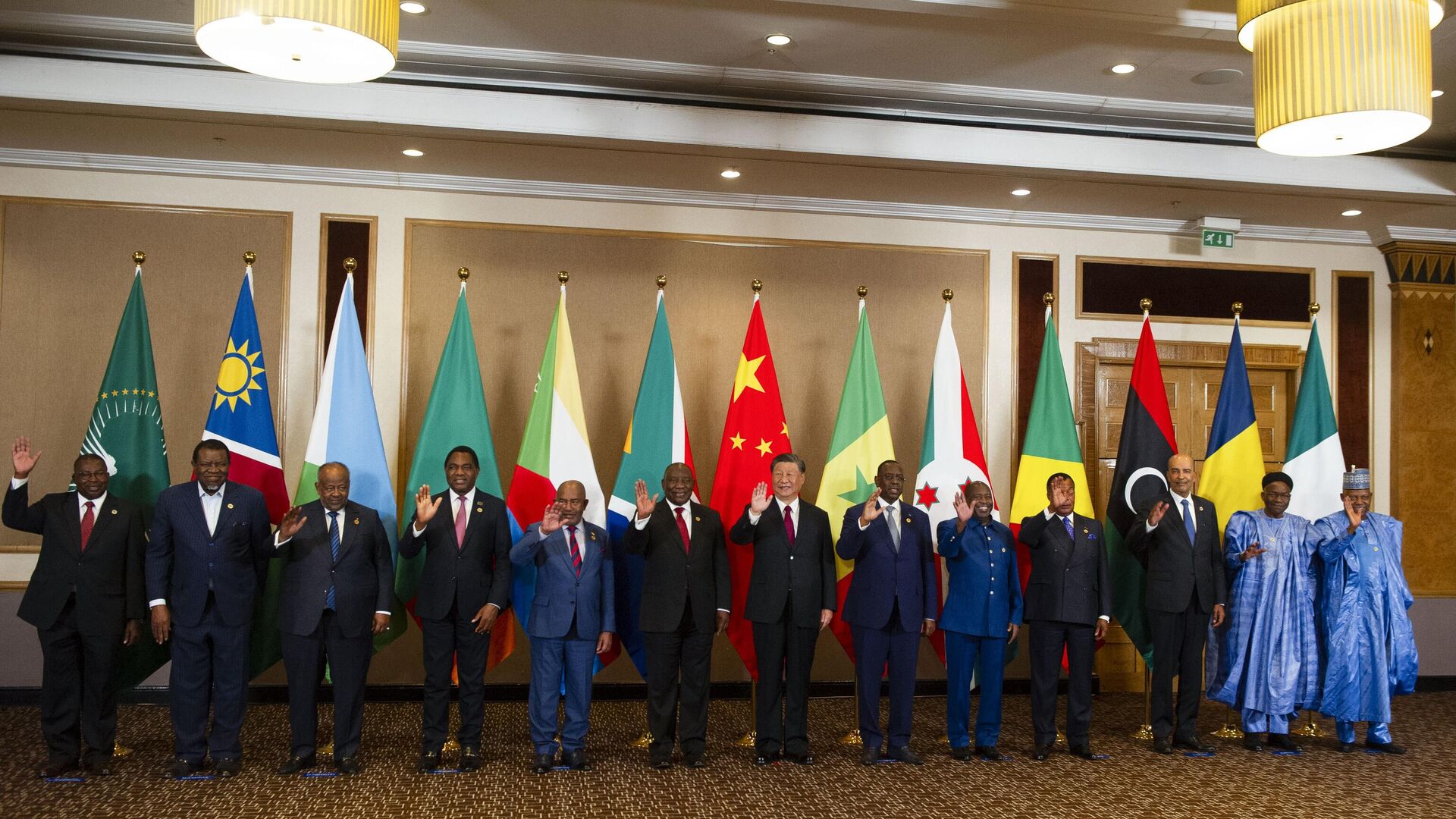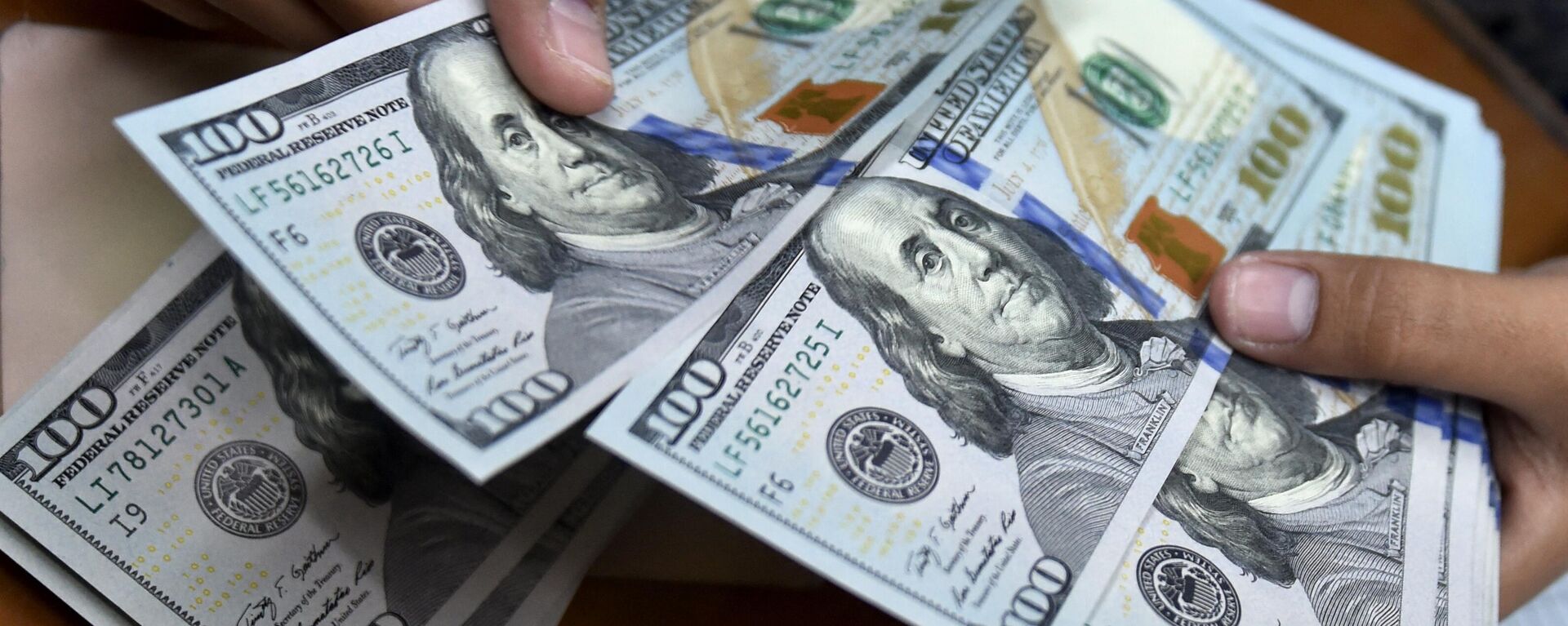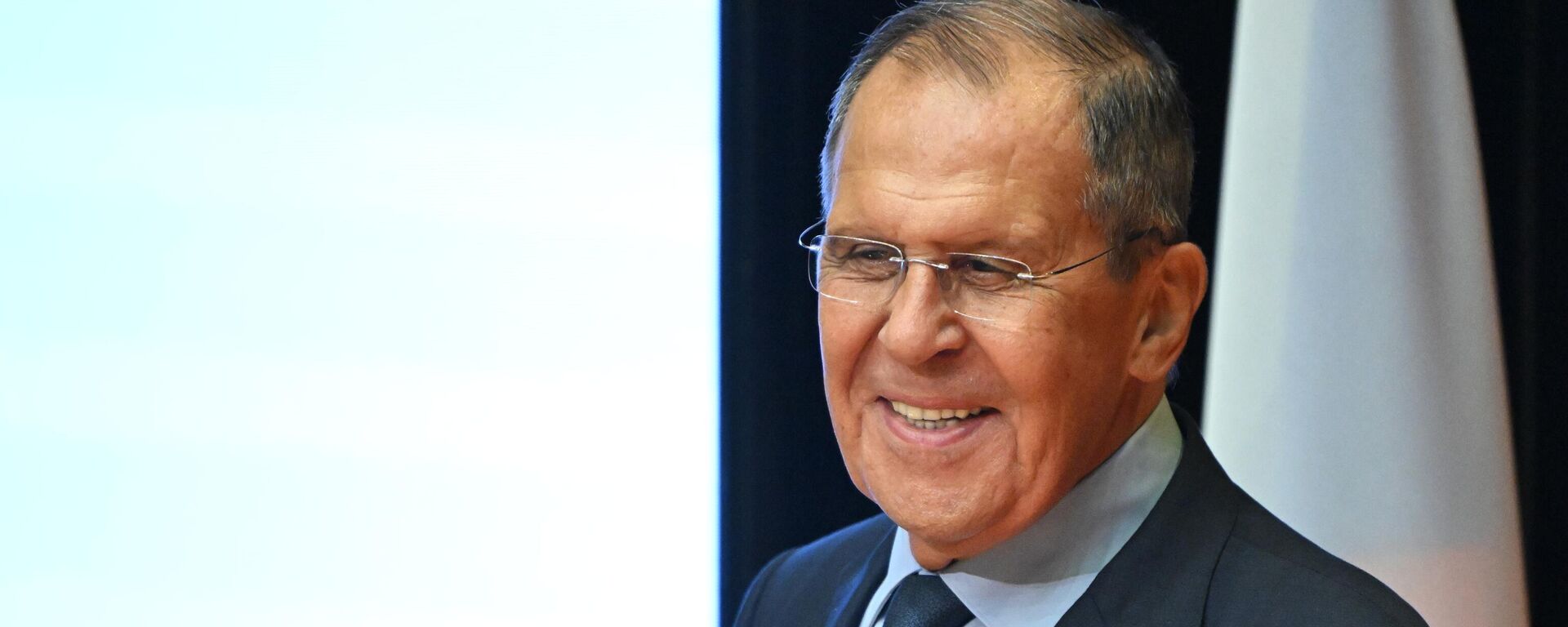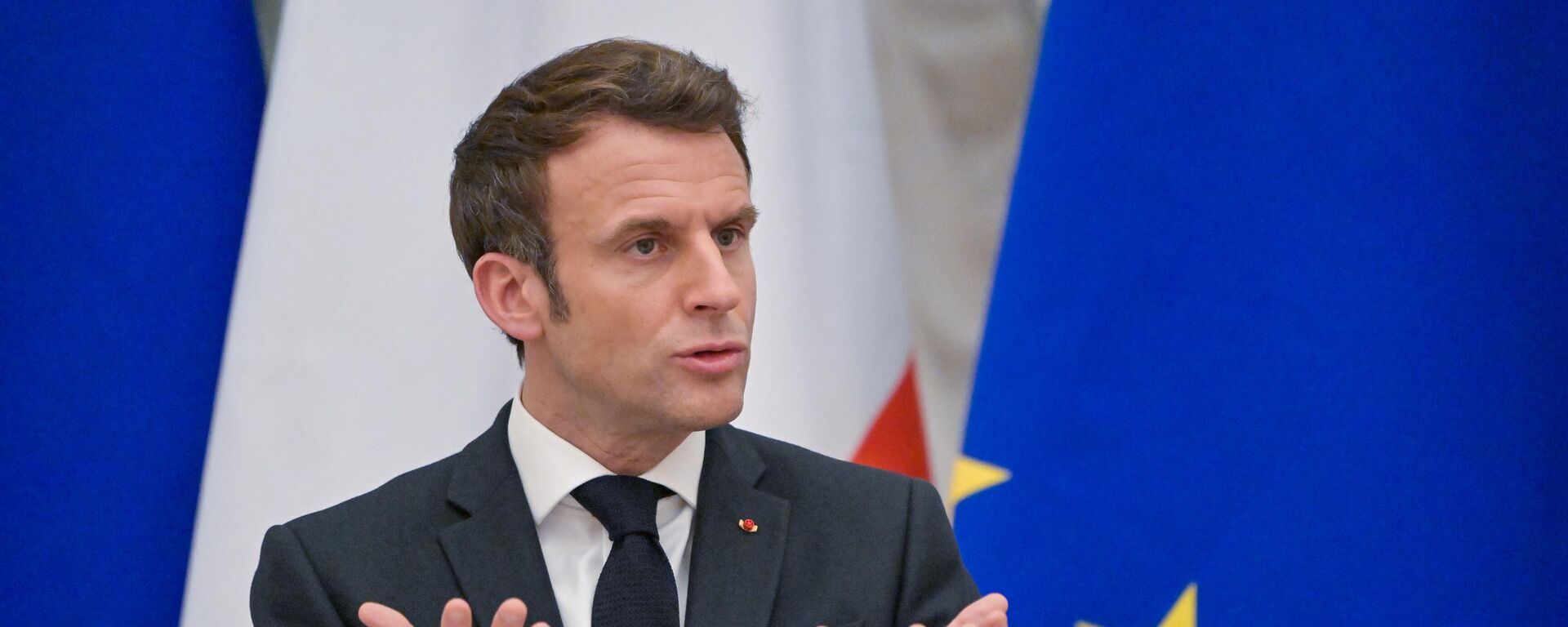https://en.sputniknews.africa/20230913/brics-brings-balance-to-international-system-dominated-by-west-expert-says-1062092565.html
BRICS Brings Balance to Western-Dominated International System, Experts Say
BRICS Brings Balance to Western-Dominated International System, Experts Say
Sputnik Africa
On Tuesday, the UN celebrated South-South Cooperation Day under the theme "Solidarity, Equity and Partnership: Unlocking South-South Cooperation to Achieve the... 13.09.2023, Sputnik Africa
2023-09-13T18:43+0200
2023-09-13T18:43+0200
2023-09-14T15:09+0200
narendra modi
cyril ramaphosa
xi jinping
united states (us)
saudi arabia
iran
brics
brics expansion
brics summit
multipolarity
https://cdn1.img.sputniknews.africa/img/07e7/09/06/1061921142_0:159:3077:1890_1920x0_80_0_0_fde1d19ce3ec2d121b01794a700c4ab5.jpg
BRICS is trying to balance the world system, which has been consistently under the control of Western countries, professor, lecturer at the Zimbabwean Bindura University of Science Education Bowden B.C. Mbanje told Sputnik Africa on the occasion of the UN Day for South-South Cooperation.Mbanje added that the Western states that dominated international relations are the so-called Five Eyes countries, namely the United States, the United Kingdom, New Zealand, Australia and Canada.The professor asserted that Indian Prime Minister Narendra Modi, South African President Cyril Ramaphosa, Chinese leader Xi Jinping and Brazilian President Lula da Silva concurred at the BRICS Summit, held on August 22-24, that the organization "is there to counterbalance western hegemony."According to the expert, the reason why the Western world has managed to dominate the international system is the US dollar. Commenting on the greenback's prevalence in international trade, the researcher explained that the countries of the bloc are trying to overcome it by using local currencies, while buying goods from each other, which is "more efficient, cheaper." Along with counterbalancing the West, the growth of trade within the Global South, using national currencies rather than the US dollar, bolsters relations between the nations of the Southern Hemisphere, Mbanje noted.During the BRICS Summit, the participants decided to work on the possibility of boosting the use of national currencies in trade.Speaking about the organization's expansion, the expert stressed the inclusion of such oil-rich states as Iran, Saudi Arabia, the United Arab Emirates will "improve the welfare" of the African population.One of the main outcomes of the group's summit is the approval of the application of six nations for club membership. Argentina, Saudi Arabia, the UAE, Iran, Egypt, Ethiopia will become full participants in January.Commenting on the UN day for South-South cooperation, Mbanje underscored that this day indicates the importance of partnership between developing countries.The professor also noted that South-South cooperation seeks to fix the "skewed" trading system and facilitate the formation of a multipolar architecture.According to the researcher, this trend towards multipolarity is "quite healthy" for Global South nations, adding that it is "challenging that sort of unipolar trading system where only a few Western developed countries would actually have more say in trade affairs."He also stressed that if previously, developing countries were only being seen in the international system, but never heard, as the Latin American scholar, Paulo Freire would say, now enhancing the partnership between each other enables states of the Southern Hemisphere to "be heard on the world stage."Among the instruments, with which the West imposed its order on the international community, the professor named the World Trade Organization, the World Bank, the International Monetary Fund, "democratic principles", and the Bretton Woods institutions.However, the expert underlined that South-South cooperation allows the developing countries to combat this Western diktat.Elaborating on this concept, Mbanje pointed out that the partnership between such countries as China, India, Brazil, South Africa and others "is challenging the Eurocentric world," "creating a bulwark to counter Western dominance." Answering the question on how the South-South cooperation could be further reinforced, the professor noted that the developing countries themselves should realize that they have been disadvantaged for so many years by these developed countries.According to the expert, the reason the southern states lagged was the lack of technologies, which is now could be overcome with the help of such developing states as China, India, Brazil, for example.In addition, if the abovementioned countries will share their technologies with other developing states, there are going to be a balance in the international system, Mbanje highlighted, noting that the West did not share technological innovation with the Global South fearing it will surpass the developed states.Furthermore, the professor stressed that another factor necessary for the strengthening South-South cooperation is mutual trust between the developing states.The researcher also underlined that in comparison with the "win-win" partnership between the southern countries, the Western development to the South is "a bit exploitative." He cited the road construction in the Democratic Republic of Congo by the Chinese, the improvement of railway network system in Ethiopia, the building of airport in Zimbabwe as the examples of the benefits of South-South cooperation.Mbanje mentioned French policy toward Niger and Mali as the cases of "exploitative" cooperation, adding that "that's why there's now tension."South-South Cooperation 'Imperative' For MultipolaritySenior Lecturer of the Department of Political Science and International Relations at the University of Fort Hare in South Africa, Valery Ferim does not agree with Mbanje's thesis that the Global South is already challenging the Western dominance. The South African expert noted, though, that the Global South has "potential, but not yet significant."Nevertheless, the professor shares the Zimbabwean's opinion that the West imposed its rules on global systems with the help of multiple instruments, including "their large economies, control of the market through manufacturing capability, ability to finance, control of technology and the overall attractiveness of their civilization."Speaking about the ways that South-South cooperation could be enhanced, the expert mentioned enlarging BRICS "as a good starting point," but also underlined the necessity to boost the partnership in different fields, including trade, culture, tourism and other areas.Continuing the point about the bloc's expansion, he cited the benefits of including new members, and the financial and economic opportunities that this offers, in addition to underlining that "BRICS hold great potential in strengthening and improving relations between countries in the Global South".Commenting on the establishment of a South-South development bank, the professor highlighted that "it should provide a much developmental, progressive and beneficial alternative to the onerous conditions that are provided by global financial institutions such as the IMF and World Bank."Speaking about the mutual development that South-South cooperation promotes in developing countries, the expert noted that "it gives them alternative avenues to buy and sell, not often dictated by Western countries."
https://en.sputniknews.africa/20230910/1062014722.html
https://en.sputniknews.africa/20230901/1061788494.html
https://en.sputniknews.africa/20230828/macron-says-brics-expansion-aimed-at-changing-world-order-perceived-as-too-western-1061697689.html
united states (us)
saudi arabia
iran
china
Sputnik Africa
feedback@sputniknews.com
+74956456601
MIA „Rossiya Segodnya“
2023
Rasina Musallimova
https://cdn1.img.sputniknews.africa/img/07e7/0a/17/1063019139_0:0:646:646_100x100_80_0_0_348c74b69cf86748a53875f8148a2f85.jpg
Rasina Musallimova
https://cdn1.img.sputniknews.africa/img/07e7/0a/17/1063019139_0:0:646:646_100x100_80_0_0_348c74b69cf86748a53875f8148a2f85.jpg
News
en_EN
Sputnik Africa
feedback@sputniknews.com
+74956456601
MIA „Rossiya Segodnya“
Sputnik Africa
feedback@sputniknews.com
+74956456601
MIA „Rossiya Segodnya“
Rasina Musallimova
https://cdn1.img.sputniknews.africa/img/07e7/0a/17/1063019139_0:0:646:646_100x100_80_0_0_348c74b69cf86748a53875f8148a2f85.jpg
narendra modi, cyril ramaphosa, xi jinping, united states (us), saudi arabia, iran, brics, brics expansion, brics summit, multipolarity, china, africa insight
narendra modi, cyril ramaphosa, xi jinping, united states (us), saudi arabia, iran, brics, brics expansion, brics summit, multipolarity, china, africa insight
BRICS Brings Balance to Western-Dominated International System, Experts Say
18:43 13.09.2023 (Updated: 15:09 14.09.2023) Longread
On Tuesday, the UN celebrated South-South Cooperation Day under the theme "Solidarity, Equity and Partnership: Unlocking South-South Cooperation to Achieve the SDGs." The commemorative date, established in 1978, is especially significant today in the context of promoting a "fairer" world order.
BRICS is trying to balance the world system, which has been consistently under the control of Western countries, professor, lecturer at the Zimbabwean Bindura University of Science Education Bowden B.C. Mbanje told Sputnik Africa on the occasion of the UN Day for South-South Cooperation.
"When you look at BRICS, you actually see that it is trying to balance the international system to bring this kind of balance, which was not there in the international system, since it was always dominated by Western democracies, [and] Western industrialized countries," he said.
Mbanje added that the Western states that dominated international relations are the so-called Five Eyes countries, namely the United States, the United Kingdom, New Zealand, Australia and Canada.
The professor asserted that Indian Prime Minister Narendra Modi, South African President Cyril Ramaphosa, Chinese leader Xi Jinping and Brazilian President Lula da Silva concurred at the BRICS Summit, held on August 22-24, that the organization "is there to counterbalance western hegemony."
According to the expert, the reason why the Western world has managed to dominate the international system is the US dollar.
Commenting on the greenback's prevalence in international trade, the researcher explained that the countries of the bloc are trying to overcome it by using local currencies, while buying goods from each other, which is "more efficient, cheaper."
"The BRICS grouping is now saying: we should buy goods from each other using our own currencies, which is more efficient, which is cheaper, which is reliable, which is also transparent. You don't have to struggle to buy goods from another country using the US dollar. That's the whole essence of the dedollarization, which is actually good news," he explained.
Along with counterbalancing the West, the growth of trade within the Global South, using national currencies
rather than the US dollar, bolsters relations between the nations of the Southern Hemisphere, Mbanje noted.
"When you now look at BRICS, we now see that it's trying to improve trade within the Global South because it makes a lot of sense that when southern countries are trading on their own, they should use their own currencies rather than over-relying on the US dollar. And when you look at BRICS, it is also counterbalancing Western hegemony and also improving the relations between and among southern countries," the professor underscored.
During the BRICS Summit, the participants decided to work on the possibility of boosting the use of national currencies in trade.
Speaking about the
organization's expansion, the expert stressed the inclusion of such oil-rich states as Iran, Saudi Arabia, the United Arab Emirates will "
improve the welfare" of the African population.
"That is quite good news. It is quite good news. Remember Iran? It has lots of oil. Saudi Arabia, the UAE. So you see, these countries, the five BRICS countries and these six other countries that now want to be members of BRICS, making them 11 by next year, 2024. Such engagements will improve the welfare of the people in the south. And they also improve the relations between and among southern countries," the researcher highlighted.
One of the main
outcomes of the group's summit is the approval of the application of six nations for club membership. Argentina, Saudi Arabia, the UAE, Iran, Egypt, Ethiopia will become full participants in January.
Commenting on the UN day for
South-South cooperation, Mbanje underscored that this day indicates the importance of partnership between developing countries.
"This is a very important day for all developing countries. It signifies a cooperation taking place between southern countries or developing countries. This cooperation is very, very important when we look at the international system," he said.
The professor also noted that South-South cooperation seeks to fix the "skewed" trading system and facilitate the formation of a multipolar architecture.
"When you now look at South-South cooperation, we are actually seeing that it is contributing immensely in trying to balance this skewed trading system, which we are witnessing in the international system. Through this South-South cooperation we are actually seeing that as they trade at multilateral level in a bilateral level between and among themselves these southern countries, they are in a way creating this multipolar architecture denoting that these countries now have a say in the international system. It's no longer a few countries which dominate trade," the expert explained.
According to the researcher, this
trend towards multipolarity is "
quite healthy" for Global South nations, adding that it is "
challenging that sort of unipolar trading system where only a few Western developed countries would actually have more say in trade affairs."
He also stressed that if previously, developing countries were only being seen in the international system, but never heard, as the Latin American scholar, Paulo Freire would say, now enhancing the partnership between each other enables states of the Southern Hemisphere to "be heard on the world stage."
"[Developing states] were more of living in a culture of silence, where they are condemned to passivity. But this is now a thing of the past. South-South cooperation is now making these developing countries to be heard on the world stage. This is a plus owing to South-South cooperation, and it's actually helping in the development of this multipolar architecture where we are also now witnessing a voice coming from the South owing to their trade between themselves and amongst themselves at the multilateral level and at the bilateral level, which is actually a plus for development within the South," Mbanje highlighted.
Among the instruments, with which the West imposed its order on the international community, the professor named the World Trade Organization, the World Bank, the International Monetary Fund, "democratic principles", and the Bretton Woods institutions.
However, the expert underlined that South-South cooperation allows the developing countries to
combat this Western diktat."There is now a realization between and among developing countries that the international system should not be the preserve of only a few countries. We should all dictate the terms on how states should relate with each other, on how states should trade with each other. [...] So because of South-South cooperation, we are now seeing that developing countries are now more than ever challenging this system whereby these Western countries would actually dictate the world agenda on all states," the researcher revealed.
Elaborating on this concept, Mbanje pointed out that the partnership between such countries as China, India, Brazil, South Africa and others "is challenging the Eurocentric world," "creating a bulwark to counter Western dominance."
Answering the question on how the South-South cooperation could be
further reinforced, the professor noted that the developing countries themselves should realize that they have been disadvantaged for so many years by these developed countries.
According to the expert, the reason the southern states lagged was the lack of technologies, which is now could be overcome with the help of such developing states as China, India, Brazil, for example.
"[The southern countries] used to lack that technological know-how. Now the good thing or the good news is that within the southern countries, the developing countries, they are those which have now come up with their own technologies and these technologies can also help in improving the lives of the people in other developing countries," the researcher explained.
In addition, if the abovementioned countries will share their technologies with other developing states, there are going to be a
balance in the international system, Mbanje highlighted, noting that the West did not share technological innovation with the Global South fearing it will surpass the developed states.
"We should always remember that the West and the developed countries, they have the technological know-how, but they are not willing to share it with the developing countries. They fear that if these developing countries have this technology, they will surpass the Western countries' development. So it is now up to southern countries through South-South cooperation that they also share between and among themselves some of these technologies so that they also develop," he underlined.
Furthermore, the professor stressed that another factor necessary for the strengthening South-South cooperation is mutual trust between the developing states.
"The only way of strengthening that [South-South] cooperation is through mutual benefits borne out of mutual trust. By so doing southern countries in just a few years to come, if they do share their knowledge and technological expertise with and among themselves, they will soon be at par with the developed countries," the expert revealed.
The researcher also underlined that in comparison with the "win-win" partnership between the southern countries, the Western development to the South is
"a bit exploitative." He cited the road construction in the Democratic Republic of Congo by the Chinese, the improvement of railway network system in Ethiopia, the building of airport in Zimbabwe as the examples of the benefits of South-South cooperation.
"There are so many things that are taking place. Construction of buildings, which was never the case when the Western countries were engaging with us. Southern countries on their own between and among themselves, they are doing quite a lot to help each other develop. And interestingly, the development is mutual. It's not exploitative. It's based on a win-win scenario situation whereby those countries which are engaging in those development initiatives, they are all benefiting," he said.
Mbanje mentioned French policy toward Niger and Mali as the cases of "exploitative" cooperation, adding that "that's why there's now tension."
South-South Cooperation 'Imperative' For Multipolarity
Senior Lecturer of the Department of Political Science and International Relations at the University of Fort Hare in South Africa, Valery Ferim does not agree with Mbanje's thesis that the Global South is already challenging the Western dominance. The South African expert noted, though, that the Global South has "potential, but not yet significant."
"While cooperation between countries of the Global South poses a significant alternative civilization to Western powers, I don’t think it still poses a challenge to the latter as much still remains to be desired: NATO is still strong, the United States still has scores of military bases around the world, the Dollar still remains the primary currency for global trade and trade by African countries is still largely with Western countries. So while that challenge holds potential, it is not yet significant," he told Sputnik Africa.
Nevertheless, the professor shares the Zimbabwean's opinion that the West imposed its rules on global systems with the help of multiple instruments, including "their large economies, control of the market through manufacturing capability, ability to finance, control of technology and the overall attractiveness of their civilization."
"This generally entrenches a universalization which is tantamount to Westernization (albeit pushback from the Arab World and the Asian Tigers). It is thus of essence for the Global South to cooperate in order to entrench a multiplicity of knowledge systems," Ferim added, highlighting: "Cooperation among countries of the Global South is imperative in creating a multipolar global architecture."
Speaking about the ways that South-South cooperation could be enhanced, the expert mentioned enlarging BRICS "
as a good starting point," but also underlined the necessity to boost the partnership in different fields,
including trade, culture, tourism and other areas.
"There is a need for greater synergy between countries in the Global South. The expansion of BRICS for instance is a good starting point, as the inclusion of countries like Iran shows that world politics cannot be dictated by Western powers. However, such South-South initiatives have to be strengthened through increased trade (not just in raw materials but also in transforming these into finished products), leveraging on its population to broaden its market, South-South cultural exchanges like tourism and games, and perhaps the creation of their own currency," the professor explained.
Continuing the point about the bloc's expansion, he cited the benefits of including new members, and the financial and economic opportunities that this offers, in addition to underlining that "BRICS hold great potential in strengthening and improving relations between countries in the Global South".
"The inclusion of countries like Saudi Arabia is probably an important financial injection into the group. Also, including countries like Iran provides an alternative avenue for states designated as 'pariah' by the West to also contribute meaningfully to global political economy. These countries can thus leverage their population (which is about half the worlds’) and availability of raw materials to enhance their manufacturing capability led by China and entrench an alternative political economy from that of the hegemonic West. A key achievement would be to increase trade and establish an alternative currency to the Dollar," Ferim stressed.
Commenting on the establishment of a South-South development bank, the professor highlighted that "
it should provide a much developmental, progressive and beneficial alternative to the onerous conditions that are provided by global financial institutions such as the IMF and World Bank."
Speaking about the mutual development that South-South cooperation promotes in developing countries, the expert noted that "it gives them alternative avenues to buy and sell, not often dictated by Western countries."
"Cooperation should also boost not just their production capabilities but also their manufacturing capabilities and should give them more autonomy over determining the prices of their raw materials," he concluded.





